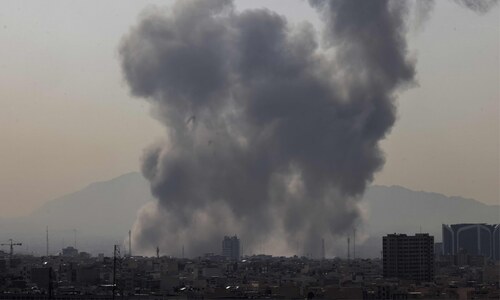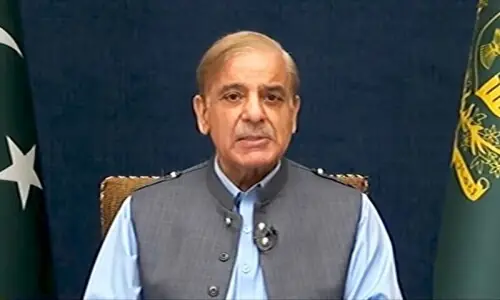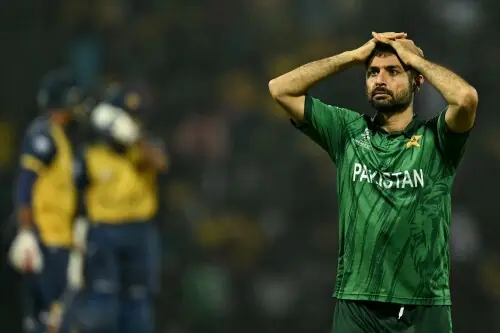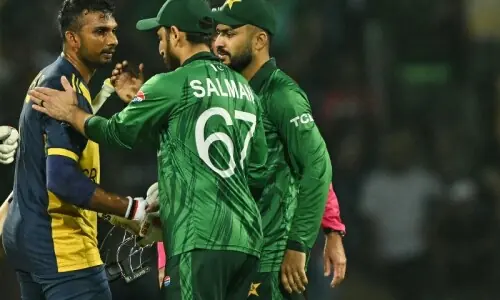
ISLAMABAD: Prime Minister Shahid Khaqan Abbasi, in his maiden speech to the National Assembly following his election on Tuesday, put forward his vision to improve the socio-economic conditions and security situation in the country, showing that he has some personal ambitions apart from the Pakistan Muslim League-Nawaz’s (PML-N) guidelines.
The otherwise reserved and media-shy Abbasi, who surprised members and visitors alike with his wit and backhanded attacks on opponents, vowed to broaden the tax net to include every affluent individual, “including those sitting in the house”.
Referring to a recently-published tax directory of parliamentarians, he said it seemed that politicians were not working with sincerity.
“Those who do not pay taxes and are living a luxurious life will have to pay taxes now,” he declared.
The NA session was called following the Supreme Court’s July 28 verdict in the Panama Papers case, disqualifying Nawaz Sharif as prime minister for failing to declare his salary as chairman of an offshore company.
PM elected in one-sided contest; Imran conspicuous by his absence from NA session
A day after the verdict, Mr Sharif nominated Mr Abbasi, the MNA from Murree, to replace him for an interim period until the election of his younger brother Shahbaz Sharif to the National Assembly.
Besides vowing to end loadshedding from the country by this November, the other major step Mr Abbasi announced was the cancellation of all automatic weapons licences in the country.
“There is not a single country in the world that allows citizens to obtain licences for automatic weapons. If you go outside parliament right now, you will see all kinds of private militias carrying automatic weapons,” Mr Abbasi remarked.
He said the government would seize all automatic weapons and compensate the people in return. However, he said that he would only take these measures if allowed by the cabinet and parliament, clearly indicating that this was his personal agenda.
In a nearly 20-minute speech, Mr Abbasi kept referring to his party boss Nawaz Sharif as the prime minister in the present tense, declaring him to be the “people’s prime minister”.
When opposition members kept heckling him with allusions to a pending reference against him for wrongdoing in an LNG contract, Mr Abbasi said that he was ready to face every charge. He said that he had been in politics for 30 years and his assets had decreased instead of increasing, during this period.
“I am grateful to the people of Pakistan, and I am grateful to the people’s prime minister Nawaz Sharif,” Mr Abbasi said. He said that he was also thankful to the opposition and Imran Khan for “remembering us in their daily slander”.
The newly-elected prime minister gave a cautious reaction to the Supreme Court verdict, terming it “unprecedented” and said that though they had implemented it, the people of Pakistan had not accepted it.
“Within four days, the democratic process is back on track. No one has left the party and we are all united,” he added.
“Justice mandates that though a 1,000 guilty people may go free, not even one innocent person should be wrongfully convicted,” he said.
“Soon there will be another court — and that will be the court of the people. There will be no JIT and we will be the witnesses there,” he said, adding: “I am sure that the real prime minister of Pakistan, Nawaz Sharif, will return to this seat”.
“I am the country’s prime minister. If I am here for 45 days, I will do 45 years of work in this time,” he said.
“Be it the government, bureaucracy, opposition or the intelligence agencies — we are in the same boat, and a hole in this boat will sink everyone,” he said. He said that they had taken difficult decisions in the past and they would continue to do so for the better country’s interest.
He also vowed to take steps to improve education, health and agriculture sectors in the country.
PM’s election
Earlier, Mr Abbasi managed to win the election of leader of the house to replace ousted prime minister Nawaz Sharif in a one-sided contest by securing 221 votes — thanks to disunity in the ranks of the opposition, which had failed to agree on a consensus candidate.
Though the PML-N’s nominee won the elections with a big margin, he secured seven votes less than the two-thirds majority in the house.
Due the opposition failure to field a joint candidate, Mr Abbasi faced three candidates from three different political parties.
Syed Naveed Qamar of the Pakistan People’s Party (PPP) secured 47 votes, followed by the 33 votes obtained by Awami Mulsim League (AML) chief Sheikh Rashid Ahmed, the nominee of the Pakistan Tehreek-i-Insaf (PTI), and four votes were obtained by Sahibzada Tariqullah of the Jamaat-i-Islami (JI).
The ruling PML-N not only succeeded in keeping intact its alliance, it also managed to woo the opposition Muttahida Qaumi Movement (MQM) and independent members from the Federally Administered Tribal Areas (Fata).
Interestingly, PTI chairman Imran Khan — who had nominated Sheikh Rashid as the party’s candidate — and the party’s secretary general Jahangir Tareen, did not turn up at the assembly, depriving Mr Ahmed of their votes.
After voting, the speaker announced the results amidst desk-thumping and roaring slogans from the treasury members, most of them carrying Nawaz Sharif’s picture.
Ignoring repeated warnings by Speaker Ayaz Sadiq, PML-N lawmakers kept on chanting slogans.
The opposition also tried to raise matching slogans. At one stage, some treasury and opposition members came face to face in front of the speaker’s dais, but they were preventing from getting physical by senior members from both sides.
The atmosphere became tense again when Sheikh Rashid mentioned the name of Maryam Nawaz Sharif in his speech. A number of PML-N members, including Capt Safdar, warned the MNA from Rawalpindi against taking the name of any member of the Sharif family.
Sensing the reaction of the highly-agitated PML-N members, Mr Ahmed changed the topic and started talking about the deteriorating economic condition of the country. However, he maintained that if he was assassinated or came to harm, then members of the Sharif family would be responsible.
The other important speech of the day was delivered by Ghulam Ahmed Bilour of the Awami National Party (ANP), who said his party had abstained in protest over the failure of the opposition to field a consensus candidate.
Mr Bilour said that he had many differences with the ousted prime minister, but the decision of the Supreme Court was not acceptable for him.
“Today, PM Nawaz Sharif has not been expelled, but the whole parliament has been hanged,” he said.
PPP’s Naveed Qamar said there was a need to strengthen institutions, and the onus was on the new prime minister.
“This seat has not been occupied very frequently in recent years and you will make it stronger if you continue to sit on it,” he said, indirectly referring to Mr Sharif’s prolonged absences.
MQM’s Farooq Sattar said that his party had voted for Mr Abbasi in the hope that he would fulfil their demands and take steps for improving the situation in the Karachi.
Mehmood Khan Achakzai of the government-allied Pakhtunkhwa Milli Awami Party said the only way to rescue the country from the situation it was in currently was to ensure that foreign and domestic policies emanated from parliament.
The National Assembly was then adjourned to meet again on Friday morning.
Published in Dawn, August 2nd, 2017






























